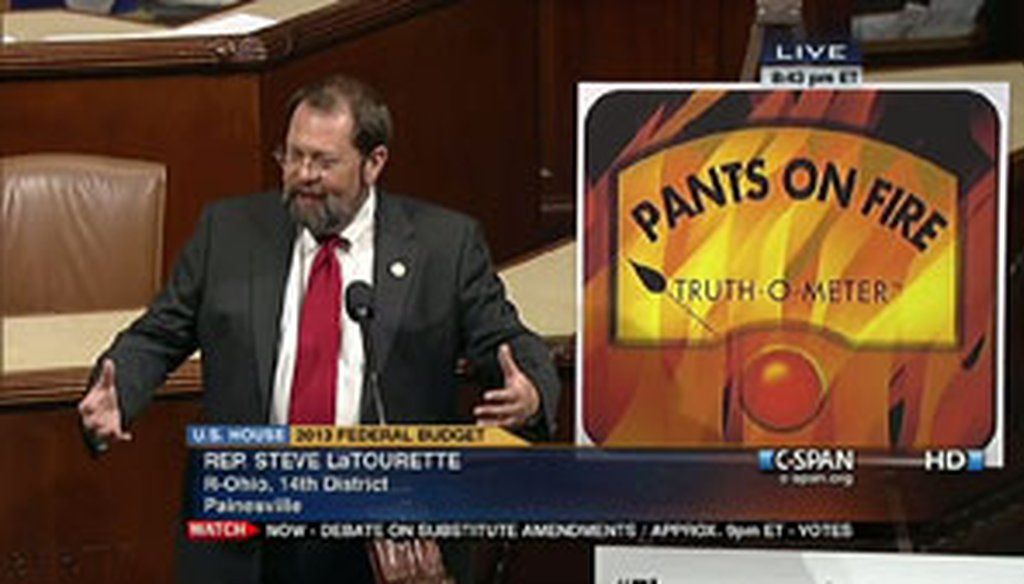Get PolitiFact in your inbox.

Rep. Steven C. LaTourette, R-Ohio, brought a poster of the Truth-O-Meter to the House floor during budget debate March 28, 2012.
PolitiFact’s 2011 Lie of the Year got some attention on the House floor Wednesday as lawmakers debated Rep. Paul Ryan's budget proposal. But several of them played fast and loose with our award-winner.
To counter Democratic criticisms of Ryan's budget, Republicans said we had labeled those claims the Lie of the Year, including one that the budget would "end the Medicare guarantee" and end Medicare "as we know it."
But that's not what we said. So we'd like to revisit what we said -- and didn't say.
• • •
This year's budget outlined dramatic changes to Medicare, as did last year's. Both were authored by Ryan, the Wisconsin Republican who chairs the House Budget Committee.
It’s not identical to last year’s proposal, but it’s close enough that lawmakers invoked much of the same rhetoric as they did last year.
Last year’s plan would have left Medicare intact for people 55 or older but dramatically changed the program for everyone else by privatizing it and providing government subsidies.
Under that plan, future beneficiaries would be given a credit and invited to shop for an approved plan on a Medicare insurance exchange.
Beneficiaries would receive "premium support payments" from the government to help pay for the private insurance. People who need more health care would get a little more money, and high earners would get less.
The plan, which received overwhelming support from Republicans in the House, had some guarantees for coverage, although seniors would have to pay more to get the benefits they receive today, according to an analysis completed last year by the nonpartisan Congressional Budget Office.
The initial Ryan plan required private insurers to accept all applicants and to charge the same rate for people who are the same age. The insurance plans would comply with standards set by the U.S. Office of Personnel Management, which administers the health plans of federal employees. The Medicare eligibility age would rise from 65 to 67, an idea that has received some bipartisan support in the past.
But while CBO found that last year’s Ryan plan would save the government money, it would do so by asking future Medicare beneficiaries to pay more for the same benefits. And under the Ryan model, there would be no guarantee that seniors could afford a plan with the same level of coverage as traditional Medicare offered.
These are significant changes from today's Medicare, but we concluded last year that Democrats often exaggerated or were incorrect in describing the Ryan plan.
Vice President Joe Biden said that the Ryan proposal "eliminates Medicare" in 10 years. A liberal advocacy group called the Agenda Project showed a Ryan look-alike pushing an old woman in a wheelchair off a cliff and claimed that the Ryan proposal would leave the country "without Medicare." And the liberal group MoveOn.org said Ryan's budget "abolishes Medicare within 10 years." And these are just three examples.
What ties these claims together is that they all stated that the GOP was ending, eliminating or abolishing Medicare. Our focus was on claims that used harsh, black-and-white terms such as "end" and "kill," and ignored important qualifiers, such as the fact that people 55 and older would still be covered by traditional Medicare.
Individually, these claims all earned ratings of either False or Pants on Fire, depending on the wording or context. And in December, we made the claim that "Republicans voted to end Medicare" our 2011 Lie of the Year.
But in discussing the issue this week -- which, we should note, was a Medicare plan that is different from last year's -- lawmakers played fast and loose with our work.
Ryan said at one point that "ending the Medicare guarantee … was rated the Lie of the Year of 2011 by the nonpartisan PolitiFact."
That’s not what we said. "Ending the Medicare guarantee" is a different claim than our Lie of the Year. (Indeed, we haven’t yet rated that particular claim.)
At another point, Ryan said, "PolitiFact labeled the line, ‘This ends Medicare as we know it’ as the lie of the year in 2011." Reps. James Lankford, R-Okla., and Steven LaTourette, R-Ohio., used the same language.
But here, too, that’s not what we said. The claim we rated for the Lie of the Year was that Republicans voted to end Medicare -- period -- not end Medicare as we know it. (In our article, we did link to one claim investigated by PolitiFact Wisconsin that a state senator wanted to "eliminate Medicare" as we know it. However, this item’s Pants on Fire rating was based largely on whether the lawmaker actually supported Ryan’s Medicare proposal.)
We should also note that LaTourette, who appeared on the House floor flanked by a poster of PolitiFact’s Pants on Fire logo, cited other statements by Democrats that he said deserved Pants on Fires. However, we should make clear that those statements are not ones we’ve actually rated.
Rep. Chris Van Hollen, a Democrat from Maryland, was more careful with his descriptions of the Lie of the Year, reading excerpts from our article and noting that "the term ‘terminate’ Medicare, which some had used, was an overstatement. No doubt about it."
(Both he and LaTourette were less accurate with our name, calling us "Political Fact.")
Van Hollen is right that "terminate" is an overstatement of what the first Ryan plan proposed. We’ll also note that we said the Democratic falsehoods were part of a long -- and often successful -- strategy to scare senior citizens into thinking they might lose their Medicare benefits.
We don't mind having our work cited in the important discussion about the future of Medicare. But if you're going to quote our Lie of the Year, please get it right.
Our Sources
Government Printing Office, "Congressional Record — House," March 28, 2012
C-SPAN Video Library, "House Session," March 28, 2011
PolitiFact, "Lie of the Year 2011: 'Republicans voted to end Medicare,'" Dec. 20, 2011
House Budget Committee, "The Path to Prosperity: A Blueprint for American Renewal," accessed March 29, 2012



















































